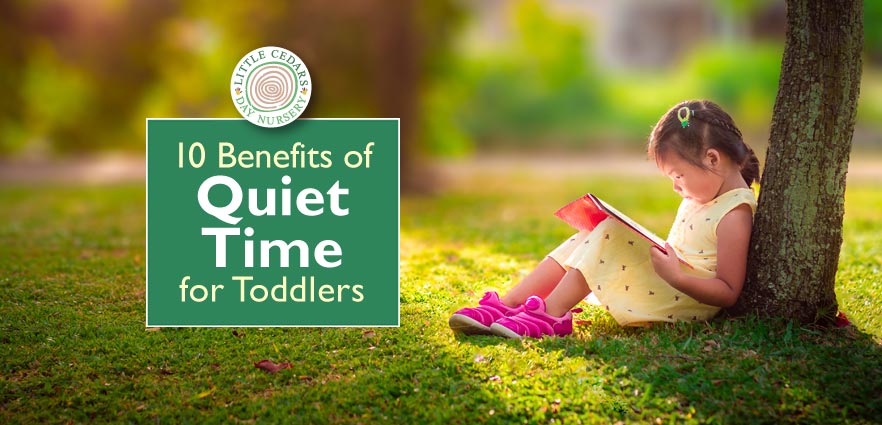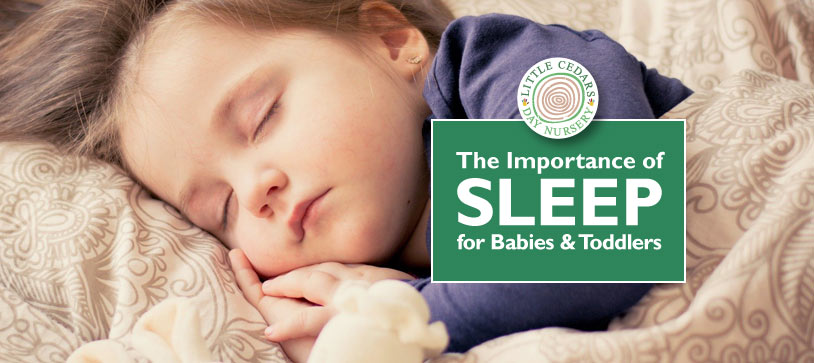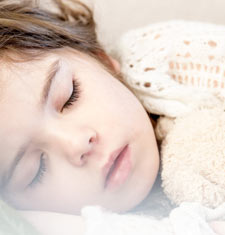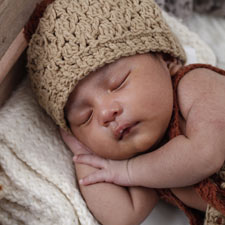
 In today’s post, we look at the importance and benefits of periods of ‘quiet time’ for toddlers and children under five. Toddlers are busy little people, often rushing around, going from one toy or activity to the next. They’re at a stage where they realise the world is an exciting place and often want to experience it all at once. However, when they are so ‘on-the-go’, playing and learning from everything and everyone around them, their brains and body have a lot to take in and process. It can be extremely tiring! So, this is where some much-needed quiet time often comes in, bringing with it a whole range of benefits. Studies also back this up.
In today’s post, we look at the importance and benefits of periods of ‘quiet time’ for toddlers and children under five. Toddlers are busy little people, often rushing around, going from one toy or activity to the next. They’re at a stage where they realise the world is an exciting place and often want to experience it all at once. However, when they are so ‘on-the-go’, playing and learning from everything and everyone around them, their brains and body have a lot to take in and process. It can be extremely tiring! So, this is where some much-needed quiet time often comes in, bringing with it a whole range of benefits. Studies also back this up.
10 Benefits of Quiet Time for Little Ones
1. An Opportunity to Relax
 With so much going on around them, children’s young senses of sight, hearing, touch and smell are experiencing a full-on assault. Their minds are also being challenged with learning new skills. This can all be very tiring for our youngsters, so a period of quiet time will give them a break, to allow them to breathe and unwind.
With so much going on around them, children’s young senses of sight, hearing, touch and smell are experiencing a full-on assault. Their minds are also being challenged with learning new skills. This can all be very tiring for our youngsters, so a period of quiet time will give them a break, to allow them to breathe and unwind.
2. The Space to Reflect
Quiet time gives children the space to reflect on the day, task or activity that they’ve been a part of. A period of quietness and relaxation will give toddlers time to think about what they have done or encountered. For example, they may reflect on the animals they have seen at the zoo or the feeling of excitement playing on the swings at the park. A little period of reflection may indeed allow their minds to ‘join the dots’ and make conclusions and even learn from what they’ve been doing.
3. Some Time to Re-charge
Slowing down and relaxing for a while will help to re-charge children’s batteries. Perhaps some soothing music can be playing in the background, or relaxing videos of underwater sea life can be played on a screen. These are great opportunities for the children to sit, slow down, be mindful and re-charge quietly.
4. An Opportunity for a Refreshing Nap
 After prolonged activity or concentration on the part of the child, a well-earned nap may well be on the agenda. As well as giving the toddler a chance to re-charge their batteries, sleep is hugely beneficial to children in their early years. For example, after sufficient sleep, children will be refreshed with improved mental and physical energy, responsive memory, better cognitive performance, increased attention spans and so much more. Their growth hormone is also produced when they sleep, so it is incredibly important in their early years. Click the bold link in this paragraph for more details. By the way, an added bonus, of course, is that a sleep session may also the parent/caregiver a chance to relax a bit and enjoy a few minutes of calm!
After prolonged activity or concentration on the part of the child, a well-earned nap may well be on the agenda. As well as giving the toddler a chance to re-charge their batteries, sleep is hugely beneficial to children in their early years. For example, after sufficient sleep, children will be refreshed with improved mental and physical energy, responsive memory, better cognitive performance, increased attention spans and so much more. Their growth hormone is also produced when they sleep, so it is incredibly important in their early years. Click the bold link in this paragraph for more details. By the way, an added bonus, of course, is that a sleep session may also the parent/caregiver a chance to relax a bit and enjoy a few minutes of calm!
5. Renewed Energy to Refocus
After a period of quiet relaxation, a solo task like looking at a book should now be easier for children. They have recharged their metaphorical batteries and are now likely to have renewed mental and physical energy to really focus on a new task.
6. Time for Some Creativity
 Quiet time provides an opportunity for children to develop their own, natural creativity. During quiet time, they have the opportunity to make up a game or activity, without intervention from others. This time is totally unstructured too, so children can be as free as they like to explore and adapt the game or activity. They can create their own little environment and immerse themselves in their own new world. Their imaginations are set free and opportunities to be creative will come naturally.
Quiet time provides an opportunity for children to develop their own, natural creativity. During quiet time, they have the opportunity to make up a game or activity, without intervention from others. This time is totally unstructured too, so children can be as free as they like to explore and adapt the game or activity. They can create their own little environment and immerse themselves in their own new world. Their imaginations are set free and opportunities to be creative will come naturally.
7. A Boost to Independence
 As we can see above, during quiet time, children can engage in activities that they have chosen for themselves. This can greatly help them to become more independent and self-reliant. That’s a great skill for them to develop as they approach the time to transition to school. There, they will need to rely much more on such skills.
As we can see above, during quiet time, children can engage in activities that they have chosen for themselves. This can greatly help them to become more independent and self-reliant. That’s a great skill for them to develop as they approach the time to transition to school. There, they will need to rely much more on such skills.
8. Precious ‘Alone Time’
Research has shown that toddlers and children that regularly have a period of ‘alone time’ often have a more positive outlook on life. During this time without distraction they relax and can then be more in control of their feelings, emotions and any anxieties. As they get older they also learn to use this time to become more content with their own company, with space to gather their own thoughts.
Of course, not all toddlers will want to be on their own. For those that don’t naturally take to it, it may help if perhaps you are sitting in the same room as them. Maybe read quietly to yourself or complete a task of your own, but quietly so the little one isn’t distracted by you. This will help them transition to some alone time.
9. Improving Sleep
Incorporating quiet time into a daily routine can help children to establish a healthy sleep schedule. It can also help them to relax and fall asleep more easily at night.
10. Improved Overall Wellbeing
When combined, all these benefits will help children to develop a sense of calm and inner peace. Stresses and anxieties will generally reduce as children’s minds and bodies relax and rest. They’ll feel refreshed and rejuvenated and ready for the rest of their day. Children’s overall mental and emotional wellbeing will benefit in a myriad of ways and it’ll help them to feel great and to accomplish tasks more easily.
How to Start Your Child on Quiet Time
 When you first introduce quiet time to your child, start slowly and begin with short periods each day. This can be increased as your little one gets used to it.
When you first introduce quiet time to your child, start slowly and begin with short periods each day. This can be increased as your little one gets used to it.- Pre-plan and ensure you have some appropriate ‘quiet time’ toys or equipment already out. In this way, the child can get to them right away and begin interacting with them. This avoids the need for them to rummage through toy boxes or cupboards and keeps things more quiet from the outset.
- You could try separating a few ‘quiet activity’ toys into separate baskets, so the toddler has a small choice of them all within easy reach. Examples might include a basket of puzzles, reading books or a basket of colouring books and crayons. Over time, remember to rotate the choices, so that your little one doesn’t become bored with the same options each time.
- Books are a good quiet activity, but also consider audio books. In this scenario, try settling your toddler with their favourite teddy and then they’re all set to listen to a story quietly and comfortably.
- Soft, relaxing music also makes an ideal backdrop to your toddler playing quietly too. Hand pick the music tracks, though, to ensure a quiet, relaxing mood.
- Other great ‘quiet time’ activities include mindfulness and breathing exercises, observing nature, building and constructing, using play dough and even, under supervision, yoga poses and stretches.
Quiet time helps the whole family recharge their batteries if only for 20 minutes to begin with. Everyone will benefit, including not only the children but parents and caregivers too — we need a bit of quiet time too!
Streatham Nursery & Pre-School Places
Little Cedars Nursery: a Wonderful Childcare Service in Streatham offering Childcare Places for Children Under 5

 Little Cedars is a nursery and pre-school in Streatham, which provides the highest quality childcare service for babies, toddlers and children under five. The nursery is a warm, welcoming home from home for under-fives and represents a great choice if you want your child to have the best start in life. We’re not just a childcare service; we provide a full early years education. Our key goal is to help children to absolutely thrive and achieve their best potential in all areas of the curriculum, in their personal development, and in life generally. The setting is conveniently located for those in Streatham Hill, Streatham Park, Streatham Common and Furzedown as well as Tooting, Tooting Bec, Tooting Broadway, Tooting Common, Balham, Norbury and Colliers Wood.
Little Cedars is a nursery and pre-school in Streatham, which provides the highest quality childcare service for babies, toddlers and children under five. The nursery is a warm, welcoming home from home for under-fives and represents a great choice if you want your child to have the best start in life. We’re not just a childcare service; we provide a full early years education. Our key goal is to help children to absolutely thrive and achieve their best potential in all areas of the curriculum, in their personal development, and in life generally. The setting is conveniently located for those in Streatham Hill, Streatham Park, Streatham Common and Furzedown as well as Tooting, Tooting Bec, Tooting Broadway, Tooting Common, Balham, Norbury and Colliers Wood.
Contact us to register your child for a place, ask a question or book a guided tour. We’ll be happy to help!


 June 2022 has seen the release of a new set of recommendations that outline ways to reduce the likelihood of sleep-related deaths amongst babies and infants up to the age of 1. This includes, but is not limited to, deaths related to Sudden Infant Death Syndrome (SIDS). Sadly, SIDS and other sleep-related issues are responsible for nearly 200 infant deaths in the UK each year and up to a staggering 3,500 every year in the United States. Perhaps even more surprisingly, that last number has not reduced at all in the last 30 or so years. This new set of recommendations from experts in the U.S. aims to change that and is something that all parents need to take a look at if they have a baby or infant. Let’s take a look at the new guidance …
June 2022 has seen the release of a new set of recommendations that outline ways to reduce the likelihood of sleep-related deaths amongst babies and infants up to the age of 1. This includes, but is not limited to, deaths related to Sudden Infant Death Syndrome (SIDS). Sadly, SIDS and other sleep-related issues are responsible for nearly 200 infant deaths in the UK each year and up to a staggering 3,500 every year in the United States. Perhaps even more surprisingly, that last number has not reduced at all in the last 30 or so years. This new set of recommendations from experts in the U.S. aims to change that and is something that all parents need to take a look at if they have a baby or infant. Let’s take a look at the new guidance … PLEASE NOTE: we have summarised key points from the new guidance in good faith but advise parents/carers of babies and infants to do their own research.
PLEASE NOTE: we have summarised key points from the new guidance in good faith but advise parents/carers of babies and infants to do their own research. 

 These are significant benefits, so high quality sleep — and the right amount — is incredibly important.
These are significant benefits, so high quality sleep — and the right amount — is incredibly important. ‘Sleep Hygiene‘ is a term that refers to the whole routine around bedtime and sleeping, including important preparation measures during the run-up to bedtime A good sleep hygiene regime will help children get to sleep and to sleep soundly.
‘Sleep Hygiene‘ is a term that refers to the whole routine around bedtime and sleeping, including important preparation measures during the run-up to bedtime A good sleep hygiene regime will help children get to sleep and to sleep soundly. The biggest message is that setting up — and sticking to — a set bedtime routine will greatly help with the quality of your child’s sleep. It sets a pattern that their minds and bodies will become used to naturally. A regime of this nature can include winding-down activities like a warm bath or shower, a peaceful book-reading session, dimmed lights and so on in the approach to bedtime. The routine will prepare them automatically for sleep even during the run-up to actually sleeping.
The biggest message is that setting up — and sticking to — a set bedtime routine will greatly help with the quality of your child’s sleep. It sets a pattern that their minds and bodies will become used to naturally. A regime of this nature can include winding-down activities like a warm bath or shower, a peaceful book-reading session, dimmed lights and so on in the approach to bedtime. The routine will prepare them automatically for sleep even during the run-up to actually sleeping. At Little Cedars Day Nursery in Streatham, we understand the importance of sleep, particularly for babies and the youngest of the children. For that reason, we ensure that children have the opportunity of a nap both in the morning and in the afternoon. For example, babies sleep for about half an hour to an hour around 9.30am and then again after lunch, for 1 to 2 hours between about 1pm and 3pm. Preschoolers don’t have to sleep if they don’t want to, but are given the opportunity to do so — every child is different. We also take a lead from parents who may prefer their child to keep to a particular sleep pattern. If you would like more information about this topic, and how we approach it at the nursery, please do get in touch.
At Little Cedars Day Nursery in Streatham, we understand the importance of sleep, particularly for babies and the youngest of the children. For that reason, we ensure that children have the opportunity of a nap both in the morning and in the afternoon. For example, babies sleep for about half an hour to an hour around 9.30am and then again after lunch, for 1 to 2 hours between about 1pm and 3pm. Preschoolers don’t have to sleep if they don’t want to, but are given the opportunity to do so — every child is different. We also take a lead from parents who may prefer their child to keep to a particular sleep pattern. If you would like more information about this topic, and how we approach it at the nursery, please do get in touch.